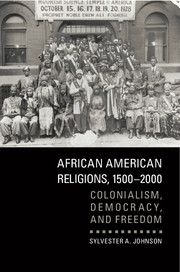Book contents
3 - Colonial Governance and Religious Subjectivity
from PART ONE
Published online by Cambridge University Press: 05 August 2015
Summary
In this chapter I examine structures of Atlantic empire that rendered Africans in the Americas as colonial subjects. In the first half I explain the architecture of governance and specific institutions that constituted discrete mechanisms of colonial rule and authority over African peoples, free and enslaved. The aim here is to explicate the tactics of empire that rendered new rationalities and that shaped the very subjectivity of all the historical actors in both the limelight and shadows of its encompassing theater. In the second half I devote attention to the theological structures of the colonial formations that shaped the fundamental categories of experience in Black Christianization. Within these two broad fields of analysis – the one attentive to political structures, the other engaged with theological formations – one discerns a profound intersection of religion and empire that elucidates the significance of “slave religion” as such while making visible the more expansive and equally significant role of colonialism in the history of Black religion.
Empire, the Company-State, and Rationalities of Freedom
The most frequent efforts to account for the complex of institutions, tactics, and practices that have come to be referenced as “modernity” replicate two common problems. First, these accounts tend to focus on the developments internal to what is imagined as a continent of Europe, so that the causal factors of modernity's irruption (i.e., at the point of modernity's emergence) bear little or no relation to the social circumstances of the rest of Asia, or Africa, or the Americas. By this account, Europe brings newness to the world. Common here is a narrow focus on the Protestant Reformation, the rise of German publishing technology, and the concomitant phenomenon of mass literacy; the emergence of Western Christian philosophy (typically with no reference to its reliance on the Islamic philosophical schools and universities); the Magna Carta and its juridical iterations; the creation of European secular institutions; and the shift from feudalism to a capitalist economy. Perhaps most important to this fantastical racial imagining is the geopolitical sleight of hand that sunders the European cape from the Asian continent, as if the cape itself were its own continent.
- Type
- Chapter
- Information
- African American Religions, 1500–2000Colonialism, Democracy, and Freedom, pp. 107 - 156Publisher: Cambridge University PressPrint publication year: 2015



